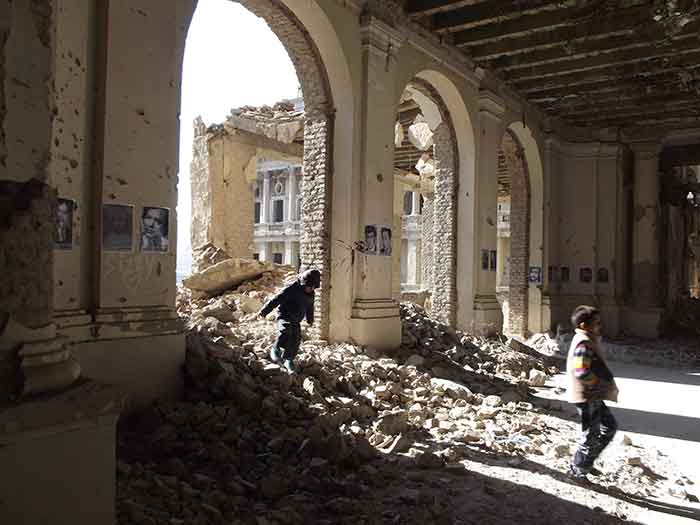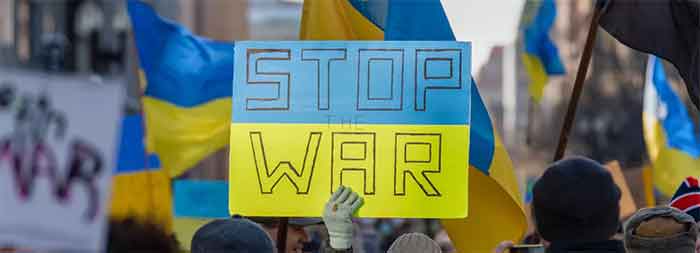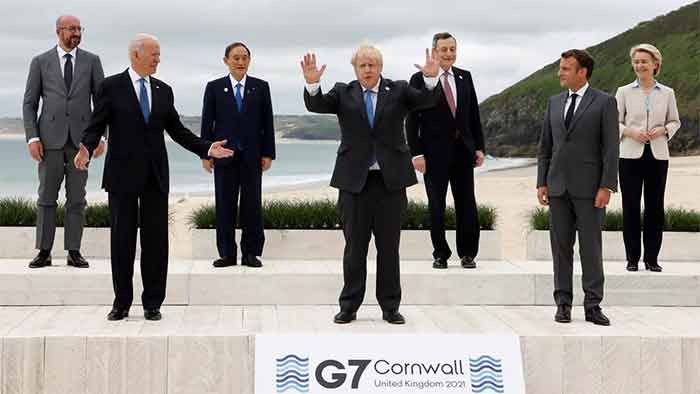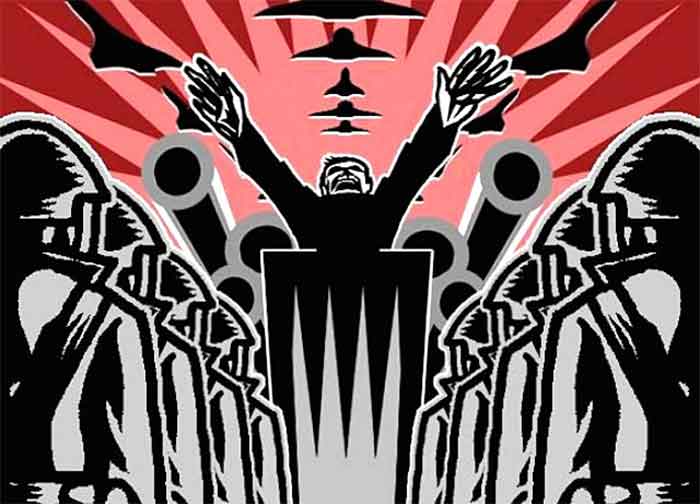
The deepening crisis of world is manifested most seriously crisis in a survival crisis, or in a situation where the basic life-nurturing conditions of our planet are threatened. In this unprecedented situation humanity has to take unprecedented decisions to ensure the safety and security of world, above all of the younger generation, our own children, who are growing up in a world faced with survival crisis at several levels.
One of the most obvious solutions that needs to be explored is that of ensuring that all future wars are avoided. We have to find the means of ensuring this, a difficult task no doubt but one which has become necessary now that this simply has to be taken up with all seriousness.
While humanity has existed for seventy thousand or more years ( or much more if we include the very early stage of the evolution of our species) the first war properly speaking dates back to just five thousand years or so, or perhaps less. Historians will fix a more exact estimate, but perhaps we can say that wars have existed only during only around 5 to 7 per cent of human history. So most of human history has been without wars and invasions , and there is no reason why we should not think of and plan for a future without wars.
Peace-loving people have always cherished a world without wars. We can even say that the majority of people have generally liked to avoid wars. Yet war has remained a highly destructive force in recent centuries of human history, peaking in the 20th century when two world wars were fought alongside numerous other highly destructive wars and civil wars.
In the 21st century wars have become so destructive that potentially millions of people can be killed in a single day of war. These deaths can be of an extremely painful nature. Besides, as long as the threat and high risks of war remain, it is unlikely that humanity will be able to create the close, enduring cooperation needed for resolving other life-threatening critical problems like those of climate change and related issues of environmental ruin. Hence, checking the threat of war has become like a survival issue now.
The possibilities of reducing the threat and risks of war can be explored at various levels. One aspect is to limit the risks of damage by ensuring the weapons of mass destruction are never used. Another aspect is to anticipate the causes which can lead to wars, particularly big wars, and then try to resolve these causes well in time. Some economic factors relating to currency, trade or control over resources or land can lead to a big war and so it should be possible to avoid war by resolving these issues peacefully in time. If the countries involved in a conflict can instead by convinced that in fact their economic and other interests will be served by cooperation with each other, then possibilities of war can certainly decrease. In existing conflict-zones possibilities of future flash points which can worsen the situation rapidly can be identified and these can be reduced.
While all these possibilities have potential and should be explored, past experience suggests that the peace movement needs to have an imagination (backed by the necessary efforts) beyond this. At a time when the world is faced by nothing less than a survival crisis, the solution must be seen in a framework much wider than what was done earlier. A wider thinking of ‘no war ever in future’ must certainly be considered, instead of striving for peace only in bits and pieces.
Tolstoy had such a broad vision and he called upon youths, (including youths of his own country) not to join any army, and he asked soldiers not to fight any war. However in practical life this is very difficult as very strong nationalist feelings exist in most countries, and these peak at the time of war, or risk of war, with a foreign power. So any voices for peace and restraint are unlikely to be prolonged or to spread widely in a situation of war or high likelihood of war. In addition if a country is not invading but instead it has been attacked in a highly unjust way then of course it will actually need courageous soldiers for completely ethical self-defence.
So only isolated efforts here and there are not adequate and will not go very far. Instead sustained efforts for a worldwide peace movement are needed which cut across narrow national boundaries and call upon all people all over the world to join in a universal effort against wars. The moral strength of such a worldwide movement, the overall conditions of goodwill created by it, will provide opportunities to people living in conditions of likely war to work on both sides to avoid any possibility of war.
Similarly the peace movement should strive to create such international peace institutions and mechanisms (or radically reform existing ones) so that it is possible to intervene at a very early stage of a possible conflict or invasion to check this.
For the peace movement to become so effective as to achieve such results, the principle of ‘universe as family’ should get increasing support and spread. This principle should emphasise our identity as world citizens whose commitment above all is to peace, justice and co-operation at the world level. Any destruction and animosity based on any narrow identity should be discouraged. Once this concept of world citizenship spreads and gives people their most rational identity, then a strong base for avoiding war, civil war and violent conflict will be created.
The next logical step will be to significantly reduce military expenditure. The size of the armed forces will be reduced heavily with alternative livelihoods provided for soldiers in work like disaster rescue and reconstruction as well as ecological regeneration. Their salaries will be protected. As people experience the benefits of this and billions worth of budgets from military expenditure are diverted to disaster prevention, environmental protection and meeting needs of people, their commitment to peace will be further strengthened. A very important part of all disarmament efforts has to be to aim for the elimination of all existing weapons of mass destruction and to prevent the emergence of new such weapons like robot, AI and autonomous weapons.
We have got so used to the present day structuring and governance of world based on rigid borders for nation states that most of us do not envisage any other structure and governance pattern. However in the human history going back to tens of thousands of years this kind of rigid division has existed only for a relatively short period of this history and in terms of the entire history of humankind it may be much more normal to think of a world which is not rigidly divided by national boundaries. What is more, human beings are the only species among millions of species living on earth who have this understanding of being divided on the basis of nation states.
Also it is important to remember that the boundaries of several nations were drawn up arbitrarily by colonial rulers. In the late 19th century and the early years of the 20th century, various European imperialist powers divided the continent of Africa arbitrarily among themselves without taking into account the needs and wishes of African people, including survival needs of pastoral nomadic people. The sheer recklessness of the entire exercise has been described by historian Arjun Dev, “The process of the imperialist conquest of Asia and Africa was accompanied by intense rivalries and conflicts among the European imperialist powers. The competing claims over colonies often created conditions of war. However, generally most of these conflicts were resolved in the conference rooms of Europe and wars were avoided. The European powers settled their rival claims – which country would acquire which territory – on the basis of quid pro quo of, ‘something for something’, by giving away something in exchange for receiving something. For example, in 1904, after a long period of conflicting claims, which had brought them almost to the point of a war, Britain and France entered into a secret agreement whereby Britain was given a ‘free hand’ in Egypt and in exchange Morocco was to be given to France. When Germany came to know about it, she demanded that France relinquish her claim to Morocco. A series of international crises followed, bringing Europe to the brink of war. The Moroccan issue was finally settled in 1911 when France agreed to give a portion of French Congo to Germany and Germany informed France that she could do what she liked in Morocco. In creating these crises and in resolving them, the people of French Congo or Morocco, whose territories were being bargained, had no say.”
Such was the arbitrariness of dividing this continent of millions of people that at the end of the entire exercise, many national boundaries appeared on the map as straight lines (more or less). In South Asia, the British-supported partition of India was equally arbitrary and a technical expert who had little acquaintance with ground reality was summoned from Britain to draw boundaries to divide a civilisation whose known history went back to thousands of years. A new nation (Pakistan) was created in two parts, the two parts separated from each other by hundreds of miles of another country (India). The arbitrary, artificially partition claimed nearly one to two million lives in 1947, and its legacy (the birth of yet another new nation, Bangladesh) claimed another 2 to 3 million lives in 1971.
The artificial boundary lines imposed on many countries by imperialist powers have also left behind the cause of several possible violent conflicts. In addition the livelihood of millions of people has been disrupted due to the artificial boundaries – in particular nomadic and semi-nomadic people have been very adversely affected.
All these are important issues to be considered as all peace loving people of the world try to come together in numerous ways and move steadily towards a future without wars.
Bharat Dogra is a journalist and author
GET COUNTERCURRENTS DAILY NEWSLETTER STRAIGHT TO YOUR INBOX















































